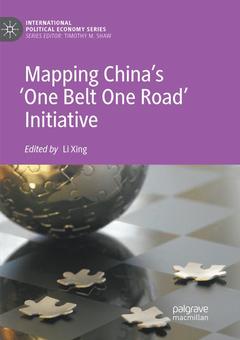Mapping China’s ‘One Belt One Road’ Initiative, 1st ed. 2019 International Political Economy Series

This book sets out to analyze how the OBOR initiative will influence the world?s geo-political and geo-economic environment, with specific regard to the ?Belt and Road? countries and regions. It evaluates what opportunities the OBOR can offer them in light of the constraints they face, paying particular attention to how security issues may keep some nations from fully participating. Questions are also asked about the tension and conflict along the ?Belt? and ?Road?, which, after all takes in the Middle East?s most tumultuous regions, as well as the much disputed South China Sea. Finally, consideration is given as to how the world?s other economic powers will react when the OBOR inevitably brings about capital and resource competitions.
Chapter 1: China’s pursuit of the One Belt One Road initiative: A new world order with Chinese characteristics?.- Chapter 2: Understanding the multiple facets of China’s One Belt One Road initiative.- Chapter 3: A framework for the study of the One Belt One Road initiative as a medium of principle-diffusion.- Chapter 4: The One Belt One Road initiative and China’s multilayer multilateralism.- Chapter 5: The One Belt One Road initiative and the changing multi-scalar governance of trade in China.- Chapter 6: China’s momentum: The One Belt One Road's triple securitization.- Chapter 7: Unpacking economic motivations and non-economic consequences of connectivity infrastructure under the One Belt One Road initiative.- Chapter 8: The One Belt One Road initiative: Reintegrating Africa and the Middle East into China’s system of accumulation.- Chapter 9: Changing regional order and railway diplomacy in Southeast Asia with a case study of Thailand.- Chapter 10: A power shift underway in Europe? China’s relations with Central and Eastern Europe under the One Belt One Road initiative.- Chapter 11: Conclusion: The One Belt One Road and the politics of fear and hope.
Li Xing is Professor and Director of the Research Centre on Development and International Relations at the Department of Culture and Global Studies, Aalborg University, Denmark. He is also Editor-in-Chief of Journal of China and International Studies.
Maps the internal policy implications of the 'One Belt One Road’ (OBOR) initiative for all effected countries
Analyzes the likely impact of the OBOR initiative on the IPE infrastructure between effected countries
Provides insight into how security, geopolitical and geoeconomic issues may prevent countries from fully participating in the OBOR initiative
Considers what changes to directly implicated countries will mean for the balance of resources and power globally
Equips policy-makers of stakeholder countries with the knowledge and conceptual tools for effective governance
Date de parution : 12-2018
Ouvrage de 298 p.
14.8x21 cm
Date de parution : 08-2018
Ouvrage de 298 p.
14.8x21 cm
Thème de Mapping China’s ‘One Belt One Road’ Initiative :
Mots-clés :
China; Foreign policy; International political economy; 'One Belt One Road' initiative; South China sea dispute; Middle East conflict; The silk road; Railway infrastructure; Global security; Thailand; Eastern Europe; Central Europe; Asia; Xi Jinping; Economic corridors; Public private partnerships; Energy clusters; Industrial clusters; Investment-led growth; Interdependent Hegemony theory



